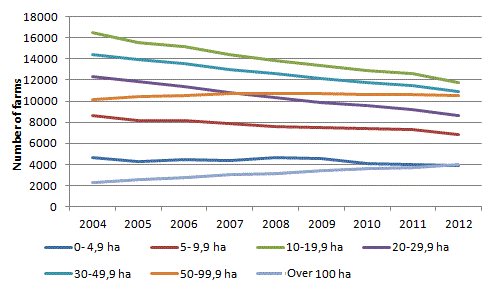Published: 3 April 2014
Average size of farms has grown in the 2000s
The number of all types of farms has decreased from 2004 to 2012 by a total of around 18 per cent. The biggest drop in the number of farms, around 30 per cent, took place in the size class where farms are sized between 20 to 30 hectares. The number of the smallest farms that are under five hectares decreased by 15 per cent over the same period. The number of farms increased in the size classes where the farm size is over 50 hectares. Between 2004 and 2012, the number of farms in the size class 50 to 100 hectares grew by four per cent. The number of the largest farms that are over 100 hectares increased by 74 per cent over the same period. Examined by region, the number of farms sized over 50 hectares has grown most, by approximately 35 per cent in the region of Central Ostrobothnia. The growth in the number of the largest farms that are over 100 hectares has been fastest in the region of Etelä-Savo, where there were 21 farms sized over 100 hectares in 2004 and as many as 79 in 2012. These data derive from the 2012 statistics on the finances of agricultural and forestry enterprises published by Statistics Finland.
Development of the number of farms in 2004 to 2012 by size category

In the review, agriculture and forestry are examined separately. The results of agricultural enterprises are examined in Section 1 of the review. In 2012, the number of active agricultural enterprises taxed on the basis of the act on the income tax of agriculture was in all 56,623 and the average result gained by them was around EUR 17,800. The result from agriculture corresponded to good 30 per cent of all taxable income of farmer couples. The income share of agriculture has constantly decreased in farmer households' all income. The income share of agriculture varies greatly due to differences in farms. For example, in livestock farms the majority of income comes from agriculture. Information based on personal tax data is given in Section 2 of the review and statistics on private forestry in Section 3.
Source: Statistics on the finances of agricultural and forestry enterprises, Statistics Finland
Inquiries: Juhapekka Kyllönen 09 1734 2917
Director in charge: Hannele Orjala
Updated 3.4.2014
Official Statistics of Finland (OSF):
Statistics on the finances of agricultural and forestry enterprises [e-publication].
ISSN=2489-320X. 2012. Helsinki: Statistics Finland [referred: 19.4.2025].
Access method: http://stat.fi/til/mmtal/2012/mmtal_2012_2014-04-03_tie_001_en.html

